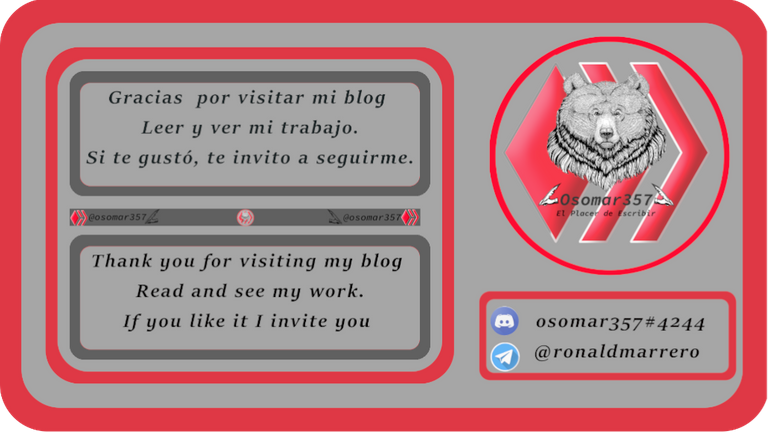¿Quién soy? # 20. Lo que ese libro me dejó. El hombre en busca de sentido. ESP/EN.


Saludo:
Antes que nada, cordiales saludos a la comunidad de Holus&Lotus y a mis seguidores y lectores. El día de hoy, me encontré con esta interesante iniciativa de @damarysvibra, en la cual nos invita a comentar sobre lo que un libro nos dejó, en un momento particular de nuestra vida.
Y realmente me parece bastante interesante esta invitación, ya que hay momentos muy fuertes en nuestras vidas, donde pasamos por situaciones muy duras y que, en ese preciso instante, muchos no estamos en capacidad de superar.
Pero muchas veces, en ese momento crítico, el cambio y el impulso que necesitamos para salir de esa situación viene de afuera, de un estímulo externo, que al recibirlo e interiorizarlo, comienza a darnos las herramientas para salir del pozo en el que creemos que nos encontramos.
Y ese impulso externo puede ser un amigo, una buena conversación, una cita con un terapeuta, el acceso a un buen libro o la mezcla de varios de estos factores.
No obstante, para las personas que leen, siempre hay uno o más libros que dejan una marca, una enseñanza y un estímulo que perdura y se hace permanente en sus vidas.
Y hoy, gracias a esta iniciativa impulsada por @damarysvibra, tenemos la oportunidad de hablar de uno de esos libros que, a nivel personal, nos ayudan a crecer, a romper barreras y a avanzar en nuestra vida.
Ahora bien, para hablar de este libro y del apoyo que me dio en un momento bastante fuerte, narraré de manera breve el momento y la situación en que este texto llegó a mis manos.
La experiencia:
Ya cuando es un adulto contemporáneo y se tienen ciertas experiencias en la vida, las situaciones que se presentan, por más duras que sean, se pueden enfrentar mejor que en la juventud, más aún cuando se proviene de una juventud privilegiada y protegida.
Sin embargo, la situación que les comento me sucedió siendo bastante joven y sin ninguna preparación para enfrentar ese tipo de circunstancias, que cambian la vida totalmente de un día para otro.
Cerca de mis veinte años, tenía todo y lo tenía en abundancia: estaba a punto de entrar a la universidad, tenía mi novia, carro, amigos y dinero. Vivía en el este de Caracas, con muy buenas comodidades, y realmente me sentía dueño del mundo y amo de la vida.
Sin embargo, hay épocas en la vida en las que todas las situaciones duras vienen una tras otra, sin espera y sin tregua. Y ese mismo año, tuve un rompimiento con mi novia, un rompimiento con la familia y una separación inmediata de todo aquello que me daba estabilidad y seguridad. Para que tengan una idea, ese mismo año terminé viviendo en una pensión.
Así que vi mi mundo desmoronarse, paso a paso, frente a mis ojos y sin poder hacer nada para impedirlo. Y, por supuesto, caí en un estado depresivo, vivía amargado y le echaba la culpa de mi situación a terceros, desde el gobierno, hasta los vecinos. En esos momentos, hablar conmigo era proyectarse en un estado de odio, rencor e incomprensión, en medio de todas mis frustraciones.
Fue una época en la que perdí la fe en todo, y donde vivir realmente se hacía pesado. No tenía nada que me motivara y solo veía el lado negativo de las cosas. También me di cuenta de que muchos de los que consideraba amigos solo estuvieron mientras estaba bien y tranquilo, pero cuando pasó la situación y yo tomé las decisiones que tomé, prácticamente me quedé solo. Y, de hecho, me encerré en esa soledad.
Tenía un trabajo precario, vivía en una pensión, no tenía ni un televisor, estaba enfrentado a mi familia y, lo peor, es que en medio de toda esa locura insistía en que yo era el único que tenía la razón y que el mundo estaba equivocado.
Por tener esa actitud, me cerraba todas las puertas que de alguna u otra manera se me abrían, por la ceguera, el rencor y el ego.
La llegada del libro:
En esa situación, conocí a una persona bien interesante, un muchacho de Brasil que llegó a vivir en la pensión y que, después de un tiempo, se convirtió en mi amigo.
Y un día, hablando en la pensión, le pregunté cómo estaba tan alegre si vivíamos en ese sitio y con esas limitaciones. Y él me comentó algo que me dejó pensando por un buen tiempo, algo muy simple, pero a la vez muy complejo.
Me dijo: "El problema es que tú nunca vas a ser feliz, ya que eres incapaz de disfrutar lo que la vida te da y solo te dedicas a exigirle lo que tú crees que ella te debería dar, sintiéndote frustrado e infeliz al no conseguirlo". Esas no fueron exactamente sus palabras, pero algo muy parecido.
Y al día siguiente, después de esa conversación, me regaló un libro llamado El hombre en busca de sentido, escrito por Viktor Frankl. Lo que hice fue ponerlo en la mesa de noche y después me fui a tomar cervezas con él.
El fin de semana, que estaba sin hacer nada y algo aburrido, me senté a leer el libro. Al leer la historia de Viktor Frankl en un campo de prisioneros nazi, al ver todo lo que le habían quitado y lo que había perdido, me di cuenta de que mis quejas y mi realidad no eran más que la actitud grosera y egocéntrica de un niño consentido.
En fin, y para no hacer esto tan largo, puedo decir que el libro El hombre en busca de sentido, de Viktor Frankl, me ayudó a darle un sentido real a mi vida en un momento de crisis. Me ayudó a perdonar, a aceptar el perdón y volver a mi familia. Para después ser misionero capuchino y poder pasar por todas las experiencias que me han convertido en lo que ahora soy justo aquí.
Si alguna persona quiere leer el libro, puede hacerlo a través de este enlace.
Para finalizar, quiero invitar a participar a: @esbat, @alicia2022, @nahueldare3627, @tothc.kretz, @akrros.
Muchas gracias por haberme leído.




To Read in English

[Source/Source](https://pixabay.com/es/photos/hombre-mesa-de-trabajo-hierba-1853961 /)

Greeting:
First of all, warm greetings to the Holus&Lotus community and to my followers and readers. Today, I came across this interesting initiative by @damarysvibra, in which he invites us to comment on what a book left us, at a particular moment in our life.
And I really find this invitation quite interesting, since there are very strong moments in our lives, where we go through very difficult situations and that, at that precise moment, many of us are not able to overcome.
But many times, at that critical moment, the change and the impulse we need to get out of that situation comes from outside, from an external stimulus, which upon receiving and internalizing it, begins to give us the tools to get out of the pit in which we think we are.
And that external impulse can be a friend, a good conversation, an appointment with a therapist, access to a good book or the mixture of several of these factors.
However, for people who read, there is always one or more books that leave a mark, a teaching and a stimulus that lasts and becomes permanent in their lives.
And today, thanks to this initiative promoted by @damarysvibra, we have the opportunity to talk about one of those books that, on a personal level, help us grow, break barriers and move forward in our life.
Now, to talk about this book and the support it gave me at a rather strong moment, I will briefly narrate the moment and the situation in which this text came into my hands.
The experience:
Already when you are a contemporary adult and you have certain experiences in life, the situations that arise, no matter how hard they are, can be faced better than in youth, even more so when you come from a privileged and protected youth.
However, the situation I am telling you happened to me when I was quite young and without any preparation to face such circumstances, which change my life completely from one day to the next.
In my early twenties, I had everything and I had it in abundance: I was about to enter college, I had my girlfriend, car, friends and money. I lived in the east of Caracas, with very good amenities, and I really felt like I owned the world and I loved life.
However, there are times in life when all the hard situations come one after another, without waiting and without truce. And that same year, I had a breakup with my girlfriend, a breakup with the family and an immediate separation from everything that gave me stability and security. To give you an idea, that same year I ended up living in a boarding house.
So I watched my world fall apart, step by step, in front of my eyes and without being able to do anything to stop it. And, of course, I fell into a depressive state, I lived bitterly and blamed my situation on third parties, from the government, to the neighbors. In those moments, to talk to me was to project yourself in a state of hatred, rancor and incomprehension, in the midst of all my frustrations.
It was a time when I lost faith in everything, and where living really became burdensome. I had nothing to motivate me and I only saw the negative side of things. I also realized that many of those I considered friends were only there while I was well and calm, but when the situation happened and I made the decisions I made, I was practically left alone. And, in fact, I locked myself in that loneliness.
I had a precarious job, I lived in a boarding house, I didn't even have a TV, I was confronted with my family and, the worst thing is that in the midst of all this madness I insisted that I was the only one who was right and that the world was wrong.
Because I had that attitude, I closed all the doors that somehow or another opened to me, because of blindness, spite and ego.
The arrival of the book:
In that situation, I met a very interesting person, a boy from Brazil who came to live in the pension and who, after a while, became my friend.
And one day, talking at the boarding house, I asked him how he was so happy if we lived in that place and with those limitations. And he told me something that left me thinking for a long time, something very simple, but at the same time very complex.
He told me: "The problem is that you are never going to be happy, since you are unable to enjoy what life gives you and you only dedicate yourself to demanding from her what you think she should give you, feeling frustrated and unhappy at not getting it." Those weren't exactly his words, but something very similar.
And the next day, after that conversation, he gave me a book called The Man in Search of Meaning, written by Viktor Frankl. What I did was put it on the nightstand and then I went to have beers with him.
On the weekend, which I was doing nothing and somewhat bored, I sat down to read the book. When I read the story of Viktor Frankl in a Nazi prison camp, when I saw everything that had been taken from him and what he had lost, I realized that my complaints and my reality were nothing more than the rude and self-centered attitude of a spoiled child.
Anyway, and not to make this so long, I can say that the book The Man in Search of Meaning, by Viktor Frankl, helped me to give a real meaning to my life at a time of crisis. He helped me to forgive, to accept forgiveness and to return to my family. To later become a Capuchin missionary and to be able to go through all the experiences that have made me what I am right here now.
If anyone wants to read the book, they can do it through this enlace.
Finally, I want to invite to participate: @esbat, @alicia2022, @nahueldare3627, @tothc.kretz, @akrros.
Thank you very much for having read me.




¡Excelente!
Hola, me alegra que te haya gustado.
¡Por supuesto! ¡Un placer!
Allí conociste dos amigos, el libro fue uno. Es inimaginable todo lo que puede despertar en nosotros la lectura de una buena obra. Las reflexiones que nos dejan repercuten en nuestra manera de pensar y comportarnos.
Saludos cordiales.
Hola @Charjaim, mis saludos y mejores deseos.
En realidad, los libros muchas veces sueles ser amigos cordiales y con grandes consejos, y siempre, pasado un tiempo, hay algunos libros que hay que volver a leer, ya que te dan un nuevo mensaje, debido a las experiencias que uno obtiene en la vida.
Muchas gracias por el comentario.
Feliz tarde.
It's very nice that you have found meaning in your life.
 Please vote for the new Ecency Proposal.
Please vote for the new Ecency Proposal.
Hi @sekorama, thanks a lot for the support.